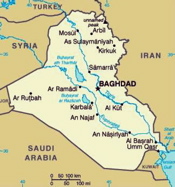On a cool evening in March, 2006, I toured a makeshift prison on an Iraqi army base in northwestern Baghdad, not far from the dim chamber where Saddam Hussein would later be executed. The jail was crude, a few rooms guarded by men in track suits who casually balanced rifles over their shoulders like golf clubs. The cells were unbarred, unclean, and unlocked; nothing more than rooms in a large building that might once have been a school. The prison was run by the Iraqi Ministry of the Interior, a shambling bureaucracy that had by then already been accused of corruption, sectarianism, and torture at secret prisons. A small U.S. Army team worked there with the MOI, helping train police officers and officials in the details of American-style law enforcement. Among the trainers was a 40-something sergeant, a medic in the army reserve, who volunteered to guide me around. He had been teaching the Iraqis about emergency medicine. He also had an unofficial job: helping treat and care for hundreds of inmates. The sergeant was short and slim. He stood slightly stooped and carried his arms deliberately wide of his torso, like a certain kind of athlete. I had joined him to make rounds, check in on the health of the prisoners. He performed this task alone, without an interpreter, and without any Iraqi counterpart. The MOI allowed it, but seemed uninterested in such custodial chores, nor could it reliably perform them. Iraqis entering the prison system were, in many ways, abandoned to strange and lonely destinies circumscribed by the whims of their jailers, as it had been in Saddam's time and ages before.
Shades of Justice: Scenes of Law, Order and Reality in Iraq

